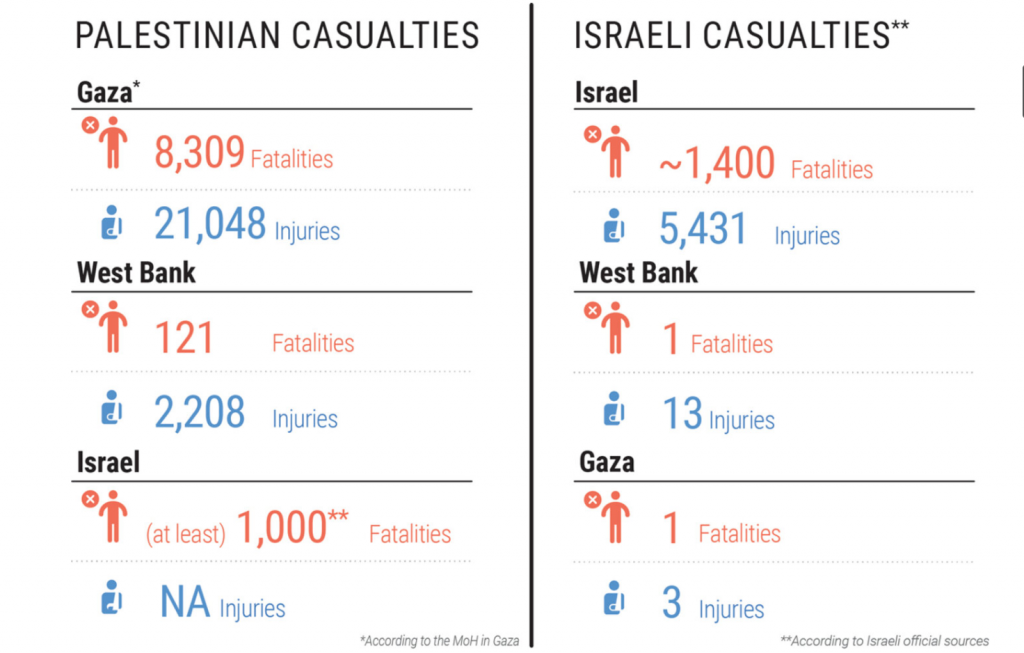
The fallout of the Israeli war against Hamas not only includes many deaths and injuries on both sides, but the death of privacy for Palestinians living in Israel, many of them complain. (Source: United Nations)
Palestinians Complain of Extensive Israeli Surveillance Systems throughout Country
Among the tools Israel is using in its war against Hamas are U.S. drones that have flown and gathered data. Although Hamas has hundreds of miles of tunnels under Gaza City used for war operations and to hide the hostages its terrorists took on October 7, Israel has expansive electronic surveillance abilities both in and outside of the country. An article from wired.com explains how some of it works.
Lab Rats
“The West Bank has long been seen as a testing ground for Israeli surveillance technology and tactics. Its defense exports have doubled in the past decade, partially thanks to the success of companies producing surveillance systems, like Elbit, Candiru, and Rafael, as well as NSO Group, which produces the Pegasus spyware. But on October 7, on the other side of Israel, the country’s famed surveillance network failed. Hamas gunmen breached the high-tech border separating Gaza from Israel and murdered 1,400 people, taking more than 200 hostages. Since then, a growing sense of paranoia has given Israel’s government the impetus to ramp up restrictions and surveillance in the West Bank, according to analysts and activists working in the region.”
If you are a Palestinian living in either the West Bank or the Gaza Strip, your facial features and your data have been collected many times throughout the years of your life.
The wired.com article describes how 35,000 Palestinians and 850 Israeli settlers live in an area where Palestinian movement is enforced with a network of surveillance that includes at least 21 manned checkpoints, on-the-spot searches, and watchtowers, plus a vast array of CCTV cameras dubbed “Hebron Smart City.” Palestinians complain this is forcing them to leave their homes because of the difficulty of getting around and lack of privacy, which leads to Israeli settlers taking over.
Photo Quotas
Another tactic being used by the IDF known as Blue Wolf, has been described as “Facebook for Palestinians.” It requires Israeli soldiers to photograph Palestinians individually via a smartphone app to record them in the database. Soldiers were even rewarded for having the most photos logged in a week.
The fighting between Jews and Arabs has been going on for centuries and it is growing in its viciousness by using the power of AI to help guide the bombs and missiles being used by both sides. Israel has a tremendous advantage over Hamas on many levels. U.S. assistance includes sending billions of dollars in aid and highly sensitive electronic weapons systems. Even though Iran is backing Hamas along with some other Mideastern government, the gap between Iran’s help and the U.S. aid Israel receives is great.
Everything Has Changed
Both sides can agree on how much everything has changed since the attacks of October 7. The prospect of this war ending soon is doubtful. The nation of Israel is outraged at Hamas and the 1,400 murders of Israelis. They are outraged over the more than 200 hostages Hamas has admitted taking. And Israelis are just as angry at their government and the man at the top Prime Minister Netanyahu. Many people place the blame for Israel not being prepared on his shoulders.
Ori Givati, a former Israeli soldier and advocacy director for Breaking the Silence, says the surveillance program is now out of control. “We have to differentiate between securing Israel, which is Israel’s duty and responsibility, and expanding the occupation. There is a huge difference. Occupying more doesn’t mean more security for Israel,” Givati says,
“I don’t think that in the long term, if we now use more systems of surveillance against Palestinians, this is what brings us security. We cannot accept this because it doesn’t work.’
The story makes it clear that the extensiveness of the intelligence-gathering system is beginning to wear on some of its operators. Even though it gives Israel an advantage in the conflict, the underground network Hamas has built for years under its most populated areas means Israel will need to conduct a grueling operation underground if it has any hope of finding hostages.
read more at wired.com







Leave A Comment